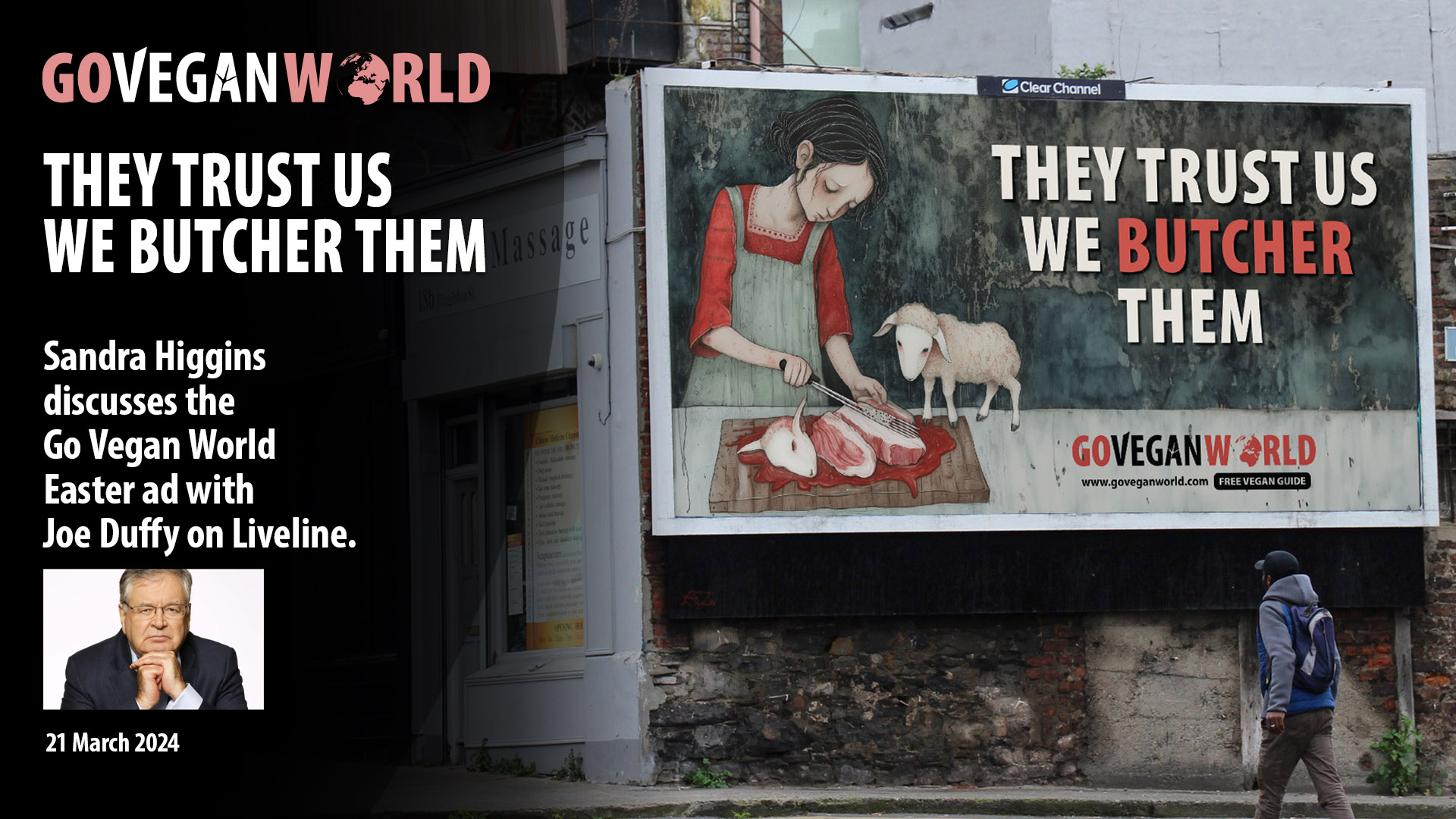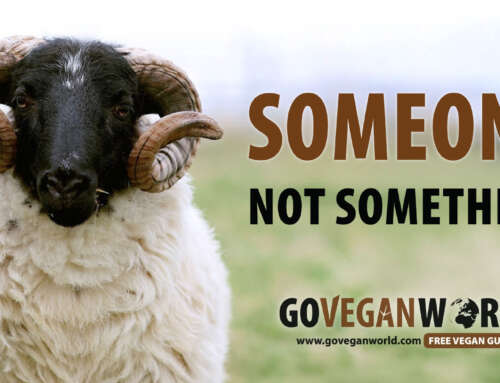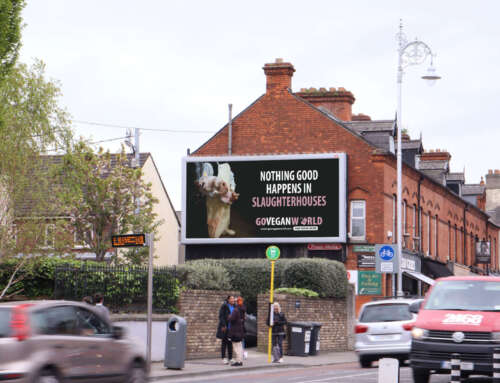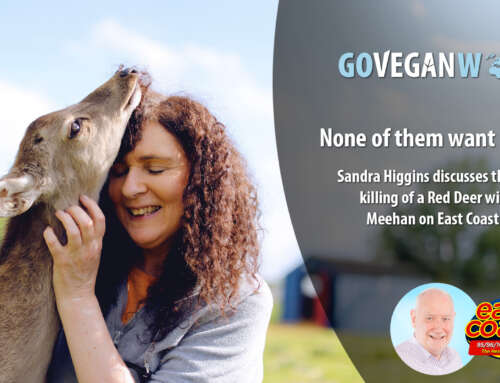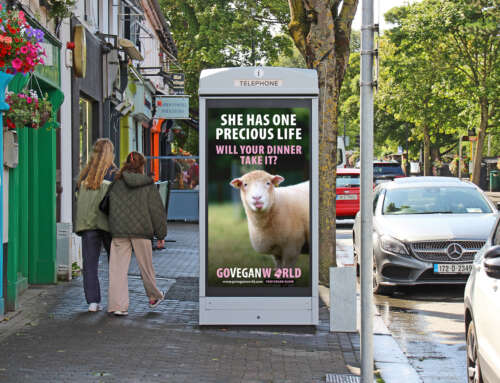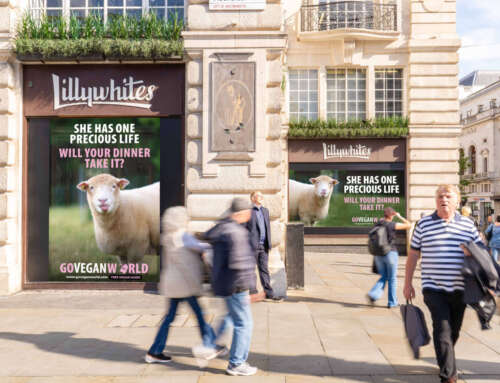Sandra Higgins discusses Go Vegan World’s Controversial ‘Spring Lamb’ ad on Liveline
22.03.24
The new Go Vegan World ‘Spring Lamb’ advert has resulted in some grievances from members of the public who find it upsetting and not suitable for their children.
The content of the ad is upsetting because it confronts us with the violent facts of killing and eating other animals. We hide this violence from children in the process of rearing them in a speciesist culture that ensures continued demand for products that profit the animal agriculture business. Are people upset because of the violence inherent in consuming other animals that our ad confronts them with, or are they upset with Go Vegan World because our ad shines a light on the truth and it is uncomfortable? Surely that is a case of shoot the messenger?
Most people care about other animals and think it is wrong to harm them. Yet most people are not vegan. Being non-vegan means using and consuming products that make their way to our shop shelves through a process that causes exploitation, harm and slaughter to other animals. The contradiction between the beliefs of non-vegans (it is wrong to harm animals) and their behaviour (using other animals in ways that cause harm and death) is immediately obvious. This contradiction is referred to as cognitive dissonance (also The ‘Meat Paradox’ and the ‘Dairy Paradox’).
The animal exploiting industries expend a lot of effort in hiding the distasteful facts of their industry from the public whose consumer behaviour profits them. One of the most powerful forms of vegan advocacy, therefore, is to educate the public on the facts of animal agriculture including the violence perpetrated against other animal by the industry that is the stuff of nightmares. It is equally as important to educate the public about animal sentience, representing them in ways that show them as feeling beings with minds who experience fear and pain, and who value their lives as much as we value ours. Our ad does both.
Many non-vegans will find our ‘Spring Lamb’ advert challenging because it reminds them that their Easter dinner was a playful, innocent baby who did not want to die. Our ad is an illustrative representation of the facts. But it is not all that different to the reality of flesh sold in butchers or supermarket, where you will see the trail of blood left on the counter or packaging from the bodies of real animals whose flesh was carved by someone wielding a lethal weapon.
We expect that many will turn from our ad in shock when faced with the reality for other animals when we purchase ‘lamb chops’ or a ‘leg of Spring Lamb’. The violence meted out to such delicate beings because we demand their bodies on our plates, is shocking. The only difference between our ad and industry/farming ads for animal flesh, is that the dismembered lamb’s face remains, reconstructing the pieces of flesh into who he or she was before they were slaughtered. Their flock mate who watches the tragedy, is represented as someone who can feel. The female in the ad also looks sad and weary as are many slaughterhouse workers who suffer workplace injury and trauma when we pay someone else to kill on our behalf. The young girl’s arms are spattered with the blood of the slaughtered lamb. Bloodshed is only ever justified when the individual or group being killed are dehumanised.
There are a number of strategies commonly adopted to deal with the discomfort of believing it is wrong to harm and kill other animals, yet living in ways that cause them to be harmed and killed. The most obvious strategy is to change our behaviour and go vegan, thereby abolishing animal exploitation from our lives and bringing our behaviour in line with our morals and beliefs.
A number of other strategies that help dissipate the discomfort of cognitive dissonance include shooting the messenger, which is very clearly the case in the criticism of Go Vegan World’s ads, denial of minds and sentience to the animals we use, denigration of vegans and veganism, appeal to the Four N’s by referring to animal use as normal, natural, necessary and nice, and referring to the myth of human supremacy. Many of these strategies are evident in this interview as Sandra Higgins of Go Vegan World discusses the Easter ad campaign with Joe Duffy on Liveline, RTE Radio 1.
If we faced the violence entailed in every non-vegan choice we make, we would not see pieces of flesh, or litres of milk, or dozens of eggs. We would see lambs, cows and calves, pigs, and chickens for the feeling beings they are. We would acknowledge that their lives have meaning for them, that they can suffer pain and fear. They remember the past and anticipate the future. They experience joy and sorrow. They have families and relationships. They have preferences. Like you and I, they feel heat and cold, hunger and thirst, they get tired, and they are motivated to keep living. Almost every aspect that makes human life worth living, is experienced equally by them.
That they are someone, not something.

